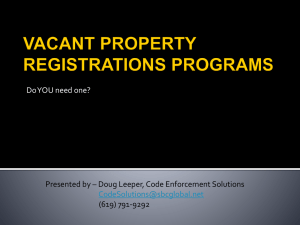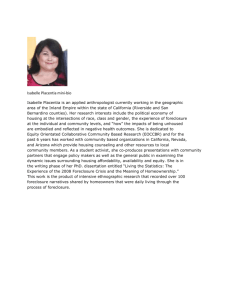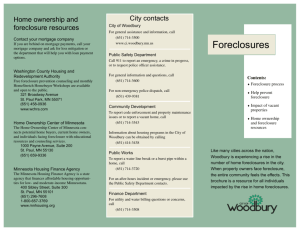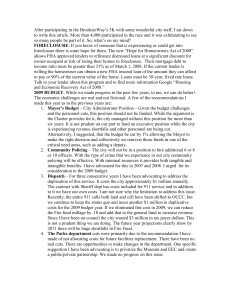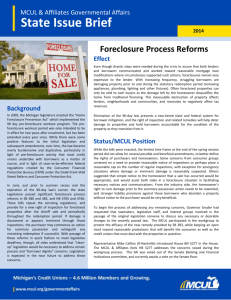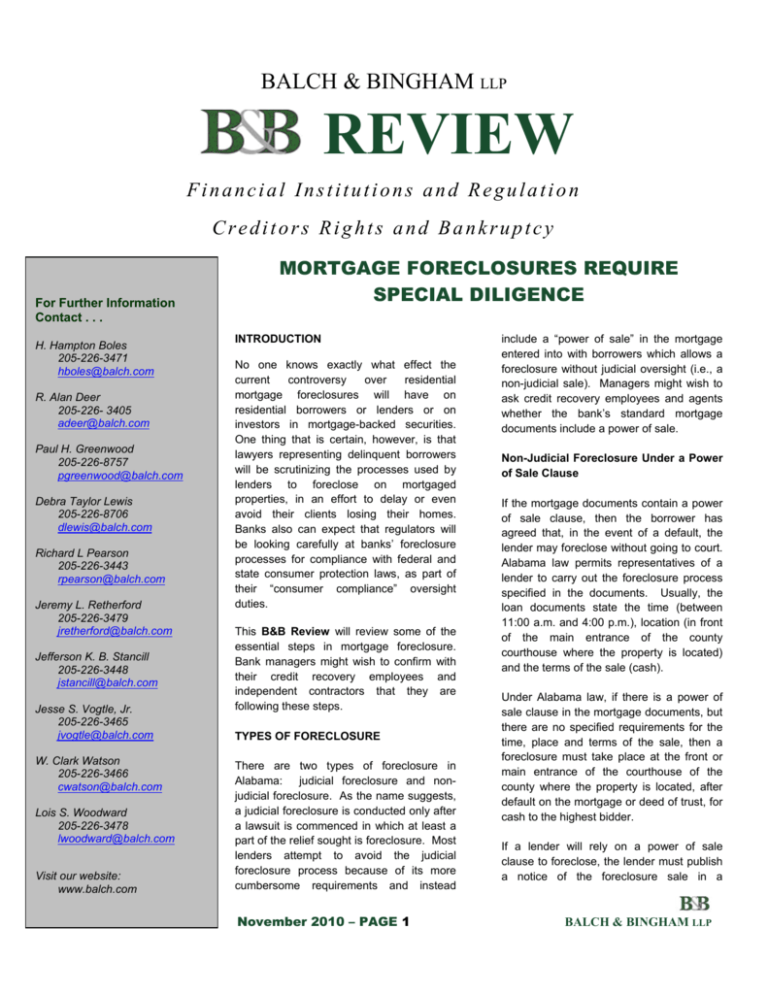
BALCH & BINGHAM LLP
REVIEW
Financial Institutions and Regulation
Creditors Rights and Bankruptcy
For Further Information
Contact . . .
H. Hampton Boles
205-226-3471
hboles@balch.com
R. Alan Deer
205-226- 3405
adeer@balch.com
Paul H. Greenwood
205-226-8757
pgreenwood@balch.com
Debra Taylor Lewis
205-226-8706
dlewis@balch.com
Richard L Pearson
205-226-3443
rpearson@balch.com
Jeremy L. Retherford
205-226-3479
jretherford@balch.com
Jefferson K. B. Stancill
205-226-3448
jstancill@balch.com
Jesse S. Vogtle, Jr.
205-226-3465
jvogtle@balch.com
W. Clark Watson
205-226-3466
cwatson@balch.com
Lois S. Woodward
205-226-3478
lwoodward@balch.com
Visit our website:
www.balch.com
MORTGAGE FORECLOSURES REQUIRE
SPECIAL DILIGENCE
INTRODUCTION
No one knows exactly what effect the
current
controversy
over
residential
mortgage foreclosures will have on
residential borrowers or lenders or on
investors in mortgage-backed securities.
One thing that is certain, however, is that
lawyers representing delinquent borrowers
will be scrutinizing the processes used by
lenders to foreclose on mortgaged
properties, in an effort to delay or even
avoid their clients losing their homes.
Banks also can expect that regulators will
be looking carefully at banks’ foreclosure
processes for compliance with federal and
state consumer protection laws, as part of
their “consumer compliance” oversight
duties.
This B&B Review will review some of the
essential steps in mortgage foreclosure.
Bank managers might wish to confirm with
their credit recovery employees and
independent contractors that they are
following these steps.
TYPES OF FORECLOSURE
There are two types of foreclosure in
Alabama: judicial foreclosure and nonjudicial foreclosure. As the name suggests,
a judicial foreclosure is conducted only after
a lawsuit is commenced in which at least a
part of the relief sought is foreclosure. Most
lenders attempt to avoid the judicial
foreclosure process because of its more
cumbersome requirements and instead
November 2010 – PAGE 1
include a “power of sale” in the mortgage
entered into with borrowers which allows a
foreclosure without judicial oversight (i.e., a
non-judicial sale). Managers might wish to
ask credit recovery employees and agents
whether the bank’s standard mortgage
documents include a power of sale.
Non-Judicial Foreclosure Under a Power
of Sale Clause
If the mortgage documents contain a power
of sale clause, then the borrower has
agreed that, in the event of a default, the
lender may foreclose without going to court.
Alabama law permits representatives of a
lender to carry out the foreclosure process
specified in the documents. Usually, the
loan documents state the time (between
11:00 a.m. and 4:00 p.m.), location (in front
of the main entrance of the county
courthouse where the property is located)
and the terms of the sale (cash).
Under Alabama law, if there is a power of
sale clause in the mortgage documents, but
there are no specified requirements for the
time, place and terms of the sale, then a
foreclosure must take place at the front or
main entrance of the courthouse of the
county where the property is located, after
default on the mortgage or deed of trust, for
cash to the highest bidder.
If a lender will rely on a power of sale
clause to foreclose, the lender must publish
a notice of the foreclosure sale in a
BALCH & BINGHAM LLP
Visit Our Offices…
1901 Sixth Avenue North
Birmingham, Alabama 35203
1710 Sixth Avenue North
Birmingham, Alabama 35203
105 Tallapoosa Street
Suite 200
Montgomery, Alabama 36104
30 Ivan Allen, Jr. Blvd., NW
Atlanta, GA 30308
1310 Twenty-Fifth Avenue
Gulfport, Mississippi 39501
newspaper of general circulation in the
county in which the property is located for
three (3) consecutive weeks prior to the
sale, unless the loan documents require a
longer period of time. Although it is not
required under Alabama law and not always
required under the loan documents, it is
generally a good practice to mail the
borrower written notice prior to the
foreclosure sale.
After foreclosure, Alabama law gives the
borrower, among other things, a “statutory
right of redemption,” which allows the
borrower to redeem the property by making
payment in full of the unpaid loan plus
certain costs and interest within one (1)
year after the foreclosure sale
Pitfalls to Avoid
Foreclosure can increase the risk of
potential claims by borrowers and other
parties against the foreclosing lender. Here
are some issues to keep in mind during the
foreclosure process:
In order to avoid any perception of
impropriety, a bank’s employees
and their family members should
not bid at a foreclosure sale.
Do not share information regarding
the property with interested
bidders (such as the amount of the
debt, the status of taxes, title work
or appraisals). If the information is
later found to be inaccurate, the
purchaser or unsuccessful bidders
may claim that their reliance on the
misinformation
resulted
in
damages.
A bank may share its opening bid
price
to
inquiring
bidders.
However, the bank should not
reveal its maximum bid price.
Courts sometimes refer to the
foreclosing lender as a “quasi
trustee” of the borrower and junior
lienholders. Revealing the bank’s
maximum bid price may be
perceived
as
lowering
the
property’s highest potential sale
price.
Judicial Foreclosure
401 East Capital Street
Suite 200
Jackson, Mississippi 39201
1275 Pennsylvania Avenue, N.W.
Washington, D.C. 20004
Disclaimer and Copyright
This publication is intended to
provide general information. It is
not intended as a solicitation, and in
the event legal services are sought,
no representation is made that the
quality of legal services to be
performed is greater than the quality
of legal services performed by other
lawyers. The listing of any area of
practice does not indicate any
certification of expertise in the area
as listed.
© 2010.
Balch &
Bingham LLP. All rights reserved.
IRS CIRCULAR 230 DISCLOSURE:
Unless explicitly stated to the
contrary,
this
communication
(including any attachments) is not
intended or written to be used, and
cannot be used, for the purpose of
avoiding penalties under the
Internal Revenue Code.
At the lender’s option, it may utilize the
judicial foreclosure process when there is
no power of sale specified in the mortgage
documents or if a compelling reason exists
as to why a judicial foreclosure may be
needed. For example, judicial foreclosure
may be appropriate if there is an issue with
the property’s title or if the mortgage to be
foreclosed needs to be reformed.
A lender that chooses a judicial foreclosure
may also file a document known as a lis
pendens (“lawsuit pending”), which provides
public notice that the property is the subject
of a judicial foreclosure action.
The same right of redemption and right to
pursue a deficiency judgment are available
to a borrower for this type of foreclosure.
DEEDS IN LIEU OF FORECLOSURE
As an alternative to foreclosure, many
states, including Alabama, allow a lender to
accept a “Deed in Lieu of Foreclosure” from
a borrower. As with other deeds, a Deed in
Lieu of Foreclosure transfers title of the
property to the lender, permitting the lender
to sell the property immediately. Because
there is no foreclosure when a lender
accepts a Deed in Lieu of Foreclosure, the
borrower will not have any right of
redemption.
November 2010 – PAGE 2
Under Alabama law, the foreclosure sale
price must not be so low that it “shocks the
conscience of the court.” The foreclosure
sale price is scrutinized by courts based on
its comparison to the property’s fair market
value, not the amount of the debt secured
by the property. Therefore, consider how
the foreclosure sale price compares to the
property’s fair market value.
BALCH & BINGHAM LLP



